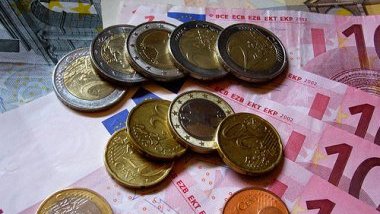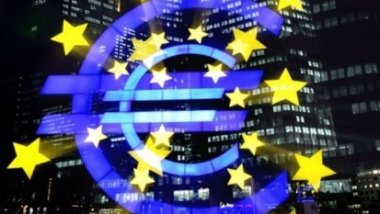Greece was not the only one in using these financial tools, other states of the Eurozone have done the same, notably France and Germany. At the announcement of the actual figures and with the deterioration of the Greek note given by international rating agencies (Fitch, Moodys), investment funds (so-called "Hedge Funds") are betting on the decline for the results of the Greek economy.
The potential funders of Greece fear bankruptcy of the country, which would place it in default of payment. To guard against this risk, they enhance the rate of their loans to Greece, which finds itself to borrow money (to pay interest on previous debts and finance its current spending) at rates of 6 to 7% (against an average of 4% for Germany), which inflates the debt service. This degrades so the public finances, further stirring distrust of lenders: It’s a snowball effect.
Is the global crisis responsible?
Of course the global crisis has played a role in the degradation of public accounts, but financial difficulties of Greece preceded the crisis. Greek economic policy during the last 10 years is called into question and Greek politicians deemed lax by Germany in particular. As summarised by Dominique Strauss-Kahn: "It is not only a debt accumulated by the crisis. It is a debt accumulated by the policy pursued by Greece for a very long time. The situation today is the some way crystallisation of old problems”. What is implicated by this is the reluctance of Greece to reduce its structural deficit. It is accused of having let go public spending and not enough fought effectively against corruption (endemic in the country) and parallel economy (representing 20% of its GDP, hence less tax revenue for the state).
What would be the interest of creating a European Monetary Fund?
Create a “kitty” (funded by members of the Euro zone) which could be used in emergencies and as a last resort if a state risks bankruptcy, with the dual effect of helping concretely and immediately the state and to reassure the markets.
The creation of such a fund is possible, but certainly not in a short term. The main obstacle is that we should revise the Treaty of Lisbon in order to create a new European institution, which is impossible in the short term because it would require a new ratification by all the 27. We know very well how long it can take, not to mention the time needed to negotiate the modalities of establishment. Furthermore, after having maintained a blur, Angela Merkel has ruled against such a solution and planned a direct intervention of the International Monetary Fund (IMF). France, initially opposed to this idea, especially seeing in the intervention of the IMF a humiliation for the Eurozone, seems to oppose not any more, or at least it remains silent after the position of Chancellor Merkel.
Why does Germany oppose prior to a rescue of Greece?
Finally, Angela Merkel may play a bluff: reluctant to announce the financial support of the country in case of bankruptcy of Greece, she lobbied Greece to take seriously its promises of reform, whereas in the case of a real bankruptcy, Germany would finally commit.
Germany has a long tradition of tight monetary policy, inherited from the crisis of 1929. For 10 years politicians have committed austerity plans which were painful for the population but they have borne fruit. Part of the German public opinion sees so the idea of a Greek rescue from a very dim. Why should they pay for the rescue of Greece whereas they have better public accounts, after great effort? Merkel is probably the relay of that opinion and perhaps she doesn’t want to disappoint her voters. Finally, Angela Merkel may play a bluff: reluctant to announce the financial support of the country in case of bankruptcy of Greece, she lobbied Greece to take seriously its promises of reform, whereas in the case of a real bankruptcy, Germany would finally commit.
A European economic government?
Theoretically foreseen in the Maastricht Treaty that created the EMU (Economic and Monetary Union), there is in fact little or no coordination between the national policies of countries in the Eurozone. The crisis has demonstrated it well. Everyone has a tendency to go alone in the common market. Thus, Germany, thanks to a compression of wages, is the champion of exports. In a word, it sacrifices its domestic demand to boost its exports, and increases thus the intra-European competition. If all EU countries did the same thing, nobody would export in the EU. The idea of a European economic government would be to coordinate national policies. Instead of increasing competitive pressure between EU countries, we should promote the competition of the EU on the world market, which would benefit all states.
Can Greece get out of the Eurozone?
The Maastricht Treaty does not permit the eviction of a Eurozone state by other states. Angela Merkel seems nevertheless in favour of it according to her last speech to the Bundestag(the German National Assembly).
Why does this crisis make the Euro down against the Dollar?
So far only Greece is undergoing a serious crisis in the Eurozone. It is not however, the only one with a negative current account and an important public deficit. It’s also the case of Spain, Portugal, France and even the United Kingdom. Hence the Investors fear of seeing the crisis spread to other countries in the region, thus falling even more Euro. Then they don’t buy any more Euros, perceived as unsafe. The decline in demand for the Euro entails a depreciation of the Euro, i.e. a decrease in the value of the Euro against the dollar.
So far only Greece is undergoing a serious crisis in the Eurozone. It is not however, the only one with a negative current account and an important public deficit. It’s also the case of Spain, Portugal, France and even the United Kingdom.
For the Eurozone the decline of the Euro is not necessarily a bad thing. For individual countries, it depends. A weak Euro boosts exports and expensive imports. The problem is that all Euro area countries are not benefiting from the decline of the Euro: the exporting countries led by Germany benefit, while some exporting countries, including Greece, suffer. This means that there is a risk of aggravating the snowball effect of Greek debt and penalising the country even more.




Follow the comments: |
|
